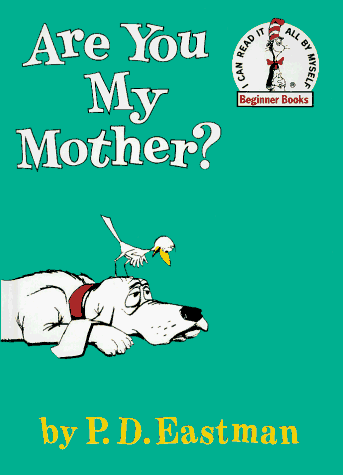Emily Wilson of the Department of Classical Studies at the University of Pennsylvania begins her review of books that span “three millennia of motherhood” with a charming distillation of Philip Dey Eastman’s classic story for “beginning readers,” Are You My Mother?:
Are You My Mother? starts with a mother bird who realizes that her egg is about to hatch. Being a good, responsible mother, she flies off to get the hatchling something to eat when he emerges. In the meantime, the baby bird pops out of the egg, falls “down, down, down!” from the nest, and finds himself alone in the world, unable to fly or fend for himself. But he can walk, and he decides to look for his mother. Unfortunately, and comically, he does not know what she looks like. So he walks right past her, though the reader sees her, busily engaged on tugging up a nice fat worm. He encounters a series of animals and other objects, and asks each of them in turn, “Are you my mother?”. Finally, a huge power shovel – which, being the largest, seems like the most likely maternal candidate of all – lets out a scary-sounding “SNOOOORT!”, and lifts the baby “up, up, up!”. The illusion is shattered: the baby realizes, “You are not my mother! You are a big scary SNORT!”. But, in yet another thrilling reversal of fortune, the Snort drops the bird back into its own nest. Just then, the mother bird comes home. She asks, “Do you know who I am?”, and the baby bird says, “Yes!”. He knows she is his mother because she is not any of the other creatures he has encountered. He therefore knows that she is a bird, and she is his mother.
One of Wilson’s poignant insights:
“There is a deeply rooted idea in our culture that mothers, far more than fathers, are responsible not just for picking up the toys and changing the nappies, but also for how the child turns out in the end, for good or ill.”
Ms. Wilson’s conclusion:
“Mothers are all different, because they are all human. The good enough mother is one who gives her child what it needs to grow up. The good enough child is one who manages to grow up, and in doing so, is able to recognize her mother’s humanity.”
Happy Mother’s Day.


 print
print